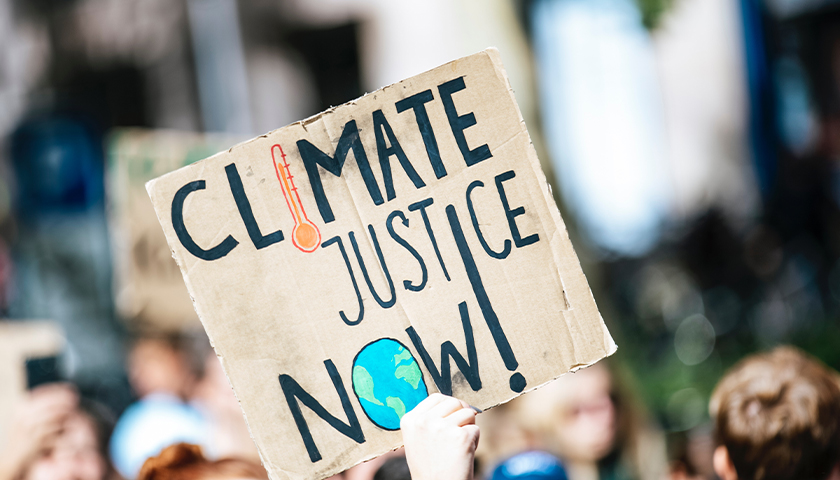by Casey Harper
President Joe Biden hosted a virtual climate summit with dozens of world leaders Thursday, the same day the White House released a set of aggressive climate goals. Critics say the plan could jeopardize the economy at a time it is recovering from record-breaking unemployment because of the pandemic and governments’ response to it.
First among those priorities is a pledge to cut U.S. greenhouse gas emissions in half by the year 2030.
“The United States is not waiting, the costs of delay are too great, and our nation is resolved to act now,” the White House said in a statement. “Climate change poses an existential threat, but responding to this threat offers an opportunity to support good-paying, union jobs, strengthen America’s working communities, protect public health, and advance environmental justice.”
That pledge would cut emissions in half from 2005 levels. The White House also pledged to create a “carbon pollution-free power sector by 2035” and reach “net zero emissions economy-wide by no later than 2050.”
Critics point out that because of COVID, U.S. emissions fell 11% in 2020, a year of economic stagnation, job loss and difficulty for millions of Americans, and that Biden’s aggressive plan would cost more jobs.
The nation’s unemployment rate increased by 10.3 percentage points to 14.7% in April 2020, according to the Bureau of Labor Statistics, the largest month-over-month since at least 1948, when the data was first compiled.
Opponents argue to continue to decrease emissions would push the economic loss much further while competing nations surged ahead.
“This Administration’s zeal for costly climate policy at home is not matched by our biggest competitors,” Senate Minority Leader Mitch McConnell said. “China’s share of emissions is nearly double ours. The Paris Agreement is largely toothless. Democrats can kill U.S. jobs & industries with no real impact on global emissions.”
Despite the fears of economic impact, the Biden administration pitched the climate plan as a job creation opportunity.
“When I think of climate change, I think about jobs,” Biden said. “Within our climate response lies an extraordinary engine of job creation ready to be fired up.”
The White House published the plan, which focused as much on job creation as environmental action. They point to jobs in the infrastructure and clean energy sector, which would receive significant federal funding under Biden’s plan.
The White House specifically named jobs to “lay thousands of miles of transmission lines for a clean, modern, resilient grid; workers capping abandoned wells and reclaiming mines and stopping methane leaks; autoworkers building modern, efficient, electric vehicles and the charging infrastructure to support them; engineers and construction workers expanding carbon capture and green hydrogen to forge cleaner steel and cement; and farmers using cutting-edge tools to make American soil the next frontier of carbon innovation.”
The administration stayed on message throughout the day.
“If we do this right, we’re going to grow a lot of jobs,” White House National Climate Adviser Gina McCarthy said during an interview.
Critics point to the loss of fossil fuel jobs, which make up nearly 7 million U.S. jobs. They cast doubt on whether “green” job creation can outpace the losses the fossil fuel industry would take under increased regulation. They also warn of blackouts and a spike in energy and consumer prices and argue the technology is not ready yet for this transition.
“We all want to reduce emissions, but we need to be smart about it,” said Heather Reams, executive director of Citizens for Responsible Energy Solutions. “We should cut energy prices, not energy choices, reduce our emissions not our economy, and export American innovation, not American jobs. The Biden administration’s proposal does the opposite.”
At a news conference Thursday touting the administration’s plan, U.S. Special Presidential Envoy for Climate John Kerry took a shot at former President Donald Trump for pulling out of the Paris Climate Accords.
“Regrettably, without any facts, without any science, without any rationale that would be considered reasonable, the former president decided to pull out,” Kerry said.
Former president Trump rolled back regulations and undid much of the work by former President Barack Obama. Now, Biden is following in his Democratic predecessor’s footsteps.
“Scientists tell us that this is the decisive decade,” Biden said to kick off the climate summit. “This is the decade we must make decisions that will avoid the worst consequences of the climate crisis.”
– – –
Casey Harper is a Senior Reporter for the Washington, D.C. Bureau. He previously worked for The Daily Caller, The Hill, and Sinclair Broadcast Group. A graduate of Hillsdale College, Casey’s work has also appeared in Fox News, Fox Business, and USA Today. Harper contributes to The Center Square.








